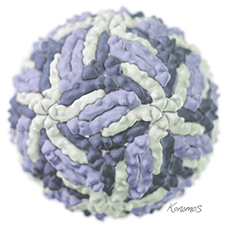Update on Zika

Zika Research Expands as Cases Multiply
 |
|
| Zika virus (medical illustration by Michael Konomos of Emory) is a mosquito-born flavivirus from the same family as dengue, yellow fever, and West Nile. |
The first infant with Zika-related microcephaly in New York City was born this summer, one of more than a dozen babies with the Zika-related birth defect to be born so far in the United States.
All were born to mothers thought to have been infected while traveling to one of 50-plus countries where Zika is endemic.
Every day, new cases of Zika are being diagnosed in pregnant women in the US and abroad.
The acceleration of the Zika epidemic has inspired new studies on the virus’s transmission, symptoms, and possible treatment. One, being conducted by Emory, Baylor, and Saint Louis University School of Medicine, involves collecting blood samples from 200 volunteers who have suspected or confirmed cases of Zika. This research group, supported by a $4 million research grant by the NIH, hopes the blood samples will help determine human immune response to Zika virus, thereby accelerating the development of a diagnostic test, infection control measures, and eventually, a vaccine.
Additionally, researchers at the Emory Vaccine Center and in Thailand discovered a possible caveat to treating this epidemic. Zika virus is genetically and geographically similar to dengue virus. Preliminary research suggests that immunity and exposure to dengue virus may impact an individual’s immune response to Zika. There are four strains of dengue virus. Exploratory laboratory tests are demonstrating that while one strain of dengue virus may give individuals antibodies with the abilities to neutralize Zika, another may worsen Zika’s effect.
Other Zika studies at Emory include determining how the virus may enter the placenta, how it affects the brain, and what serotype causes the virus. The NIH recently launched a Zika vaccine clinical trial that the Emory Vaccine Center will be participating in.—Aspen Ono 18C
Travel: Don't panic, plan
 |
As of August 24, the CDC reported 2,487 travel-related cases of Zika in the U.S., and 29 locally acquired cases.
In Georgia, more than 50 cases have been reported. Infectious disease physician Henry Wu diagnosed four of these cases at the TravelWell clinic at Emory University Hospital Midtown, in consultation with the Georgia Department of Public Health.
Wu has worked with Emory ob/gyn physicians on procedures to test patients for the virus and is collaborating with the Emory Vaccine Center’s Hope Clinic to study the disease. "For most, the risk of complications is low," says Wu. "But this is the first disease to be linked to birth defects in 50 years. That’s a big deal."
Just 20 percent of people bitten by a mosquito carrying the virus develop symptoms—fever, rash, joint pain, and conjunctivitis—which last for about a week. Zika, with its links to microcephaly and Guillain-Barré syndrome, is much more worrisome for those expecting a baby or planning to conceive.
In August, the CDC issued an unprecedented travel warning advising pregnant women and their partners not to travel to parts of Miami after more than a dozen people were infected with the virus by local mosquitoes.
"We’ve gotten a lot of calls from women and men who have questions about sexual transmission of the virus and when it’s safe to have sex or conceive," says TravelWell physician Phyllis Kozarsky. She recommends reviewing CDC guidelines for personal protection, at www.cdc.gov/zika/prevention.
"Zika hits closer to home because of the potential to affect many families right here. People ask, ‘Why weren’t we prepared for this?’ The truth is we need better public health infrastructure to deal with emerging and re-emerging diseases so we can be better prepared," says Kozarsky.—Pam Auchmutey





